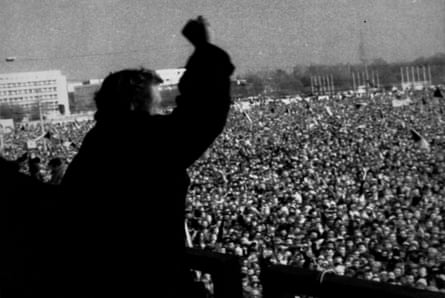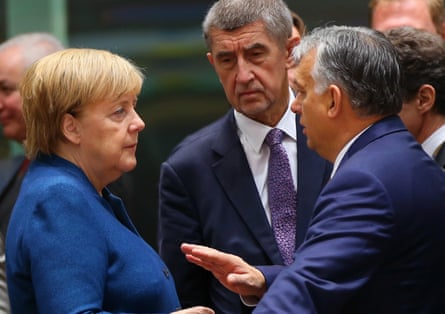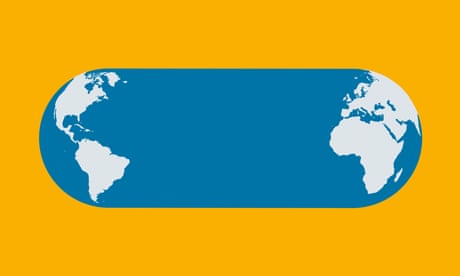自由主义如何在东欧沦为“失败的神”
How liberalism became 'the god that failed' in eastern Europe
共产主义垮台后,西方自由主义改变中欧和东欧的承诺从未完全兑现——如今,我们正目睹其遭遇的强烈反弹。
1990年春,26岁的美国人约翰·费弗花了数月时间游走东欧,希望揭开后共产主义时代东欧未来的谜团,并撰写一本关于他亲眼目睹的历史性变革的书。他并非专家,因此他没有验证任何理论,而是尽可能多地采访各行各业的人士。他所遭遇的矛盾既令人着迷又令人费解。东欧人既乐观又忧虑。当时,他采访的许多人都期望在五年内,最多十年内,过上像维也纳人或伦敦人一样的生活。但这些希望中也夹杂着焦虑和不祥的预感。正如匈牙利社会学家埃莱梅尔·汉基斯所言:“人们突然意识到,在未来的岁月里,谁将富贵,谁将贫穷;谁将掌权,谁将无权;谁将被边缘化,谁将居于中心;谁将建立王朝,谁的子孙后代将受苦,这些都将尘埃落定。”
费弗最终出版了他的书,但他并没有回到那些曾短暂地激发他遐想的国家。25年后,他决定重访东欧,寻找那些在1990年与他交谈过的人。这一次,东欧更加富裕,但却充满了怨恨。资本主义的未来已经到来,但它的利益和负担分配不均,甚至粗暴。在提醒我们“对于东欧二战那一代人来说,共产主义是‘失败的神’”之后,费弗写道:“对于该地区的当代人来说,自由主义是失败的神。”
1989年后,前共产主义国家效仿西方的努力被赋予了各种各样的名称——美国化、欧洲化、民主化、自由化、扩大化、一体化、协调化、全球化等等——但它始终意味着通过模仿实现现代化,通过同化实现融合。在当今中欧民粹主义者看来,共产主义垮台后,自由民主成为一种新的、不可避免的正统观念。他们不断哀叹,效仿西方的价值观、态度、制度和实践变得势在必行,义不容辞。
在中东欧,许多冷战结束后出现的民主国家已经转变为具有阴谋论倾向的多数主义政权。在这些国家中,政治反对派被妖魔化,非政府媒体、公民社会和独立法院的影响力被剥夺,主权被定义为领导层抵制压力以遵循西方政治多元化、政府透明以及对陌生人、异见人士和少数群体的包容性理念的决心。
没有任何单一因素能够解释21世纪第二个十年在如此多不同国家同时出现的威权反自由主义。然而,对自由民主的权威地位以及普遍的模仿政治的不满发挥了决定性作用。这种缺乏替代方案,而不是威权主义历史的引力或历史上根深蒂固的对自由主义的敌意,才是当今后共产主义社会主导的反西方精神的最佳解释。 “别无他法”的狂妄自大,为始于中欧和东欧、如今席卷全球的民粹主义仇外主义和反动本土主义浪潮提供了独立的动机。
冷战结束后,竞相加入西方是中欧和东欧人的共同使命。事实上,变得与西方毫无二致可以说是1989年革命的主要目标。对西方模式的热情模仿,以及随之而来的苏联军队从该地区撤离,最初被认为是一种解放。但在经历了二十年动荡之后,这种模仿政治的弊端变得显而易见,不容否认。随着怨恨情绪的激化,非自由主义政客的支持率上升,并在匈牙利和波兰掌权。
1989年之后的最初几年,自由主义通常与个人机会、迁徙和旅行自由、不受惩罚的异见、获得司法公正以及政府响应公众诉求等理念联系在一起。到了2010年,中东欧版本的自由主义已被二十年来日益加剧的社会不平等、普遍存在的腐败以及将公共财产随意重新分配给少数人而不可磨灭地玷污。2008年的经济危机滋生了人们对商业精英和赌场资本主义的深深不信任,更确切地说,这种不信任几乎摧毁了世界金融秩序。
自由主义在该地区声誉自2008年以来一直未曾恢复。金融危机极大地削弱了少数受过西方教育的经济学家继续模仿美式资本主义的论据。人们曾坚信西方政治经济是人类未来的典范,这与西方精英知道自己在做什么息息相关。突然之间,他们显然一无所知。这就是为什么2008年危机不仅在经济上,而且在意识形态上也产生了如此巨大的冲击。
中东欧民粹主义者得以肆意夸大欧洲自由主义阴暗面的另一个原因是,时间的流逝已经从集体记忆中抹去了欧洲非自由主义更阴暗的一面。与此同时,中东欧执政的非自由主义政党,例如匈牙利的公民联盟(Fidesz)和波兰的法律与公正党(PiS),试图诋毁自由主义原则和制度,以转移人们对腐败和滥用权力的合法指控。为了给瓦解独立新闻和司法机构的行为正名,他们声称这是在保卫国家,抵御“心怀异见”的敌人。
今年3月,在德国杜塞尔多夫举行的游行中,一辆彩车上印有波兰执政党法律与公正党领袖雅罗斯瓦夫·卡钦斯基战胜“自由波兰”的肖像。今年3月,在德国杜塞尔多夫举行的游行中,一辆彩车上印有波兰执政党法律与公正党领袖雅罗斯瓦夫·卡钦斯基战胜“自由波兰”的肖像。图片:Lukas Schulze/Getty Images
然而,关注该地区非自由主义政府的腐败和狡猾,无助于我们理解民众对民族民粹主义政党的支持来源。民粹主义的起源无疑是复杂的。但其部分原因在于,在艰苦奋斗的过程中,他们饱受屈辱,而这充其量也不过是优秀模式的低劣翻版。后共产主义时代,对“民主转型”的不满情绪,也因到访的外国“评估员”而加剧,他们对当地现实知之甚少。这些经历共同导致了该地区本土主义的反动,即对“正宗”民族传统的重新主张,而这些传统据称被不合时宜的西方模式所扼杀。与欧盟扩大相关的后民族自由主义,使得雄心勃勃的民粹主义者得以宣称对民族传统和民族认同拥有排他性。
这是该地区反自由主义运动的主要动力。但另一个次要因素是,人们普遍认为,1989年之后,除了自由主义的政治和经济模式之外,别无其他选择。这种假设催生了一种逆向思维,试图证明确实存在这样的替代方案。以德国极右翼民粹主义政党德国选择党(AfD)为例。顾名思义,该倡议的发起是为了回应安格拉·默克尔(Angela Merkel)随口宣称其货币政策“别无选择”(alternativlos)。默克尔将政府的方案描述为唯一可行的选择,从而引发了一场强烈而坚定的替代方案探索。类似的反弹,由后民族主义的常态化所引发,在前共产主义国家催生了一场反自由主义、反全球化、反移民和反欧盟的反抗,而民粹主义煽动家们则利用和操纵了这场反抗,他们深谙如何妖魔化“内部敌人”来动员公众支持。
乔治·奥威尔曾说过:“所有革命都是失败的,但它们并非都是同一种失败。” 那么,鉴于1989年革命的目标是西方式的常态,它究竟是一场怎样的失败?1989年的自由主义革命在多大程度上导致了二十年后爆发的非自由主义反革命?
1989年席卷中东欧的“天鹅绒革命”在很大程度上并未像彻底的政治动乱那样,给人类带来苦难。此前从未有过如此多根深蒂固的政权被同时推翻,并以基本和平的方式被取代。左翼称赞这些天鹅绒革命是人民力量的体现。右翼则将其颂扬为自由市场战胜计划经济的胜利,以及自由政府战胜极权独裁的当之无愧的胜利。而美国和亲美自由主义者则自豪地将自由主义与解放变革的浪漫主义联系起来,而左翼批评家们经常嘲笑自由主义是一种旨在维持现状的意识形态。当然,这些东欧地区基本上非暴力的政权更迭具有世界历史意义,因为它们标志着冷战的结束。
1989年革命的非暴力性质并非其唯一独特之处。鉴于当时富有创造力的思想家和精明的政治活动家(例如捷克斯洛伐克的瓦茨拉夫·哈维尔和波兰的亚当·米奇尼克)在公众中扮演的突出角色,1989年的事件有时会让人想起
被称为知识分子的革命。但确保这些革命保持“天鹅绒般”的,是其背后对乌托邦和政治实验的敌意。这些革命的领军人物非但无所求于任何独创的新事物,反而只想推翻一个体系,以便效仿另一个体系。
瓦茨拉夫·哈维尔于1989年在布拉格向人群发表演讲。
瓦茨拉夫·哈维尔于1989年在布拉格向人群发表演讲。图片:美联社
德国最重要的哲学家尤尔根·哈贝马斯热烈欢迎1989年后“缺乏创新或面向未来的思想”,因为对他来说,中东欧革命是“矫正革命”或“追赶革命”。他们的目标是让中东欧社会获得西欧人已经拥有的东西。
1989年的中东欧人自己也并没有梦想着一个从未存在过的完美世界。相反,他们渴望在一个“正常国家”过上“正常的生活”。70年代末,德国诗人汉斯·马格努斯·恩岑斯贝格尔访问匈牙利,与一些最著名的共产主义政权批评家交谈时,他们告诉他:“我们不是异见者。我们代表正常。”米奇尼克的后共产主义口号是“自由、博爱、正常”。几十年来,异见者一直假装期待着光明的未来,但他们的主要目标是活在当下,享受日常生活的乐趣。
从这个意义上讲,中欧精英们认为模仿西方是一条通往正常化的捷径。然而,在加入欧盟的希望的鼓舞下,改革者们低估了自由化和民主化的本土障碍,高估了引进成熟的西方模式的可行性。如今席卷中欧的反自由主义浪潮,反映出民众普遍的不满,他们认为这项看似真诚的模仿式改革计划,实际上却损害了国家和个人的尊严。
在整个东欧和中欧,共产主义垮台带来的欣喜,使人们期待着其他彻底的变革即将到来。一些人认为,只要共产党官员辞职,中欧和东欧人就能在一个截然不同、更自由、更繁荣,尤其是更西方的国家中醒来。当快速的西化进程未能如愿以偿时,另一种解决方案开始受到青睐。带着家人前往西方成为了首选。
波兰等国的异见人士曾将移民西方与叛国投降和开小差联系在一起,但1989年之后,这种观点已不再合理。一场以西化为主要目标的革命,无法对向西移民提出任何令人信服的反对理由。一个年轻的波兰人或匈牙利人,既然明天就能在德国工作养家,何必等到自己的国家有一天变得像德国一样呢?该地区的民主转型本质上是一种大规模向西迁移的形式,因此,选择只有两种:要么早点单独移民,要么晚点集体移民。
革命常常迫使人们跨越国界。1789年法国大革命之后,以及1917年布尔什维克在俄国夺取政权之后,那些被革命击败的敌人离开了他们的国家。1989年之后,选择逃离的却是天鹅绒革命的胜利者,而不是失败者。那些最渴望看到自己国家改变的人,也最渴望投身于自由公民的生活,因此他们率先前往西方学习、工作和生活。
很难想象,布尔什维克革命胜利后,托洛茨基会决定进入牛津大学深造。但未来的匈牙利总理维克托·欧尔班和其他许多人却这么做了。1989年的革命者们强烈渴望前往西方,以便近距离观察他们希望在国内建立的那种正常社会在实践中是如何运作的。
冷战后,大量人口外流,尤其是因为许多年轻人用脚投票,带来了深远的经济、政治和心理影响。当一名医生离开自己的国家时,她带走了国家为她投入的所有教育资源,也让她的国家失去了她的才华和抱负。她最终寄回家的钱,根本无法弥补她失去在祖国生活中个人参与的机会。
年轻且受过良好教育的人才外流也严重地,甚至可能是致命地损害了自由党在选举中取得好成绩的机会。年轻人的离开或许也解释了为什么在该地区的许多国家,我们发现欧盟资助的美丽游乐场里竟然没有孩子玩耍。自由党的现状很能说明问题。
在海外投票的选民中,政治表现最佳。例如,2014年,思想自由的德裔罗马尼亚人克劳斯·约翰尼斯当选罗马尼亚总统,因为30万旅居海外的罗马尼亚人以压倒性优势投了赞成票。在一个大多数年轻人渴望离开的国家,无论你过得多么好,只要你留下来,就会觉得自己是个失败者。
移民和人口流失问题将我们引向了2015-16年席卷欧洲的难民危机。2015年8月24日,德国总理默克尔决定接纳数十万叙利亚难民进入德国。仅仅10天后,也就是9月4日,由捷克共和国、匈牙利、波兰和斯洛伐克组成的维谢格拉德集团宣布,欧盟在欧洲范围内分配难民的配额制度“不可接受”。中东欧各国政府并不认同默克尔的人道主义言论。 “我认为这完全是胡说八道,”维克托·欧尔班的首席智囊玛丽亚·施密特评论道。
就在此时,中欧民粹主义者不仅宣布脱离布鲁塞尔,而且更戏剧性地宣布脱离西方自由主义及其向世界开放的精神。中欧那些散布恐慌的民粹主义者将难民危机解读为自由主义削弱了各国在充满敌意的世界中自卫能力的确凿证据。
2015年至2018年席卷中欧的人口恐慌如今正在有所消退。无论如何,我们仍然需要问一问,鉴于几乎没有移民抵达中东欧国家,为什么这种恐慌会在这些国家找到如此政治上的易燃物。
从左至右:安格拉·默克尔、捷克总理安德烈·巴比什和匈牙利总理维克托·欧尔班。
从左至右:安格拉·默克尔、捷克总理安德烈·巴比斯和匈牙利总理维克托·欧尔班。图片:Dursun Aydemir/Anadolu Agency/Getty
正如前文所述,第一个原因是移民问题。人们对移民问题的担忧源于一种担忧,即那些被认为难以融入的外国人会进入该国,削弱民族认同感和国家凝聚力。而这种担忧又源于人们对人口结构崩溃的担忧,尽管这种担忧在很大程度上是心照不宣的。1989年至2017年期间,拉脱维亚人口流失了27%,立陶宛流失了22.5%,保加利亚流失了近21%。罗马尼亚在2007年加入欧盟后,有340万人离开了该国,其中绝大多数不到40岁。人口老龄化、低出生率以及源源不断的移民潮,可以说是中欧和东欧人口恐慌的根源。 2008-2009年金融危机爆发后,离开祖国前往西欧的中欧和东欧人数量,甚至超过了叙利亚战争导致的难民总数。
1989年后,东欧和中欧的大规模移民引发了人们对国家消失的担忧,这有助于解释该地区对2015-2016年难民危机的强烈敌意,尽管很少有难民迁往该地区的国家。我们甚至可以假设,在一个基本上没有移民的地区,反移民政治正是一些心理学家所说的“流离失所”的一个例子——这是一种防御机制,在这种情况下,人们的思维会无意识地抹去一个完全不可接受的威胁,并用一个仍然严重但可能更容易应对的威胁取而代之。对根本不存在的移民即将占领该国的恐慌,代表着用虚幻的危险(移民)取代了无法言喻的真实危险(人口减少和人口崩溃)。
因此,对多样性和变革的恐惧,以及被西方重塑整个社会的乌托邦计划所激起的恐惧,是东欧和中欧民粹主义的重要推手。大量人口涌出该地区所带来的创伤,解释了原本看似神秘的现象——即使在那些从后共产主义政治和经济变革中获益良多的国家,也存在着强烈的失落感。类似地,在整个欧洲,过去几十年人口流失最严重的地区,往往最倾向于投票给极右翼政党。
深陷人口崩溃恐惧的东欧各国政府,正在寻找理由,解释为什么不满的公民,尤其是年轻人,应该犹豫是否要移居西欧。欧尔班有时听起来像是想实施一项封闭的政策,对移民和移民都实施无情的否决权。但由于他无力采取任何此类行动,他只能恳求匈牙利的年轻人不要离开。如何让匈牙利年轻人相信,他们在西方找不到更好的家园,尤其是在欧尔班自身的政策正在摧毁大多数在国内过上有意义且富有创造力的生活的机会的情况下?
华沙的民粹主义者
布达佩斯似乎把西方的难民危机变成了东方的品牌宣传机会。只有西方失去吸引力,公民才会停止前往西方。贬低西方并宣称其制度“不值得效仿”可以解释为源于怨恨的虚构报复。但它也有一个附带好处,那就是通过帮助阻止移民,服务于该地区的首要政策重点。民粹主义者抨击西欧欢迎非洲人和中东人的方式。但他们真正的抱怨是,欧盟西方成员国自己也向中欧和东欧人敞开大门,这可能会剥夺该地区最有生产力的公民。
整个讨论将我们引向当代非自由主义的一个核心思想。与许多当代理论家相反,民粹主义者的愤怒与其说是针对多元文化主义,不如说是针对个人主义和世界主义。这一点在政治上至关重要,因为一旦接受,就意味着民粹主义无法通过以个人主义和世界主义的名义放弃多元文化主义来对抗。对于东欧和中欧的非自由民主人士来说,欧洲白人基督教多数群体生存的最大威胁是西方社会无力捍卫自身。他们之所以无力捍卫自身,是因为盛行的个人主义和世界主义据称蒙蔽了他们,使他们看不到所面临的威胁。
跨大西洋网络
大西洋主义的终结:特朗普是否扼杀了赢得冷战的意识形态?
非自由民主有望开阔公民的视野。如果说20世纪90年代的自由主义共识关乎个人的法律和宪法权利,那么当今的反自由主义共识则是,受到威胁的白人基督教多数群体的权利正面临致命威胁。有人认为,为了保护这个四面楚歌的多数派脆弱的主导地位,使其免受布鲁塞尔和非洲阴险联盟的威胁,欧洲人需要用自己强硬的身份政治或群体特殊主义取代自由主义者强加给他们的、水汪汪的个人主义和普遍主义。欧尔班和波兰法律与公正党领导人雅罗斯瓦夫·卡钦斯基正是用这种逻辑试图煽动他们同胞内心的仇外民族主义。
中东欧民粹主义者对西方自由主义的终极报复,不仅仅是拒绝效仿西方,而是将其颠覆。欧尔班和卡钦斯基反复宣称,我们才是真正的欧洲人,如果西方要自救,就必须效仿东方。正如欧尔班在2017年7月的一次演讲中所说:“27年前,在中欧,我们相信欧洲是我们的未来;今天,我们感到我们就是欧洲的未来。”
本文摘自伊万·克拉斯特夫和斯蒂芬·霍姆斯合著的《失败的光芒:清算》,由艾伦·莱恩出版社于10月31日出版,可在guardianbookshop.com购买。
《失败的光芒:清算》
作者:伊万·克拉斯特夫,斯蒂芬·霍姆斯——2019年11月26日
*2020年莱昂内尔·盖尔伯奖得主*
两位杰出知识分子共同撰写的里程碑式著作,彻底改变了我们对自由主义危机的理解。
为什么西方在赢得冷战后会失去政治平衡?
20世纪90年代初,人们对自由民主向东传播寄予厚望。然而,东欧国家的转型引发了对自由主义本身的强烈批判,不仅在东欧,也波及西方腹地。
在这部精彩的政治心理学著作中,伊万·克拉斯特夫和斯蒂芬·霍姆斯认为,所谓的历史终结最终不过是模仿时代的开始。通过回顾过去三十年的历史,他们表明,始于东欧的民粹主义仇外浪潮背后最强大的力量,源于对1989年后西方化潮流的不满。
从这个角度来看,特朗普革命讽刺地实现了一个承诺:脱离共产主义统治的国家将会效仿美国。出人意料的是,特朗普却将普京领导的俄罗斯和欧尔班领导的匈牙利提升为美国的榜样。
《消失的光芒》由两位跨越东西方鸿沟的杰出知识分子撰写,是一本具有里程碑意义的著作,揭示了我们模仿时代的非凡历史。
How liberalism became 'the god that failed' in eastern Europe
After communism fell, the promises of western liberalism to transform central and eastern Europe were never fully realised – and now we are seeing the backlash.
In the spring of 1990, John Feffer, a 26-year-old American, spent several months criss-crossing eastern Europe in hope of unlocking the mystery of its post-communist future and writing a book about the historical transformation unfolding before his eyes. He was no expert, so instead of testing theories, he buttonholed as many people from as many walks of life as possible. The contradictions he encountered were fascinating and puzzling. East Europeans were optimistic but apprehensive. Many of those he interviewed at the time expected to be living like Viennese or Londoners within five years, 10 years at the most. But these hopes were mingled with anxiety and foreboding. As Hungarian sociologist Elemér Hankiss observed: “People realised suddenly that in the coming years, it would be decided who would be rich and who would be poor; who would have power and who would not; who would be marginalised and who would be at the centre. And who would be able to found dynasties and whose children would suffer.”
Feffer eventually published his book, but did not return to the countries that had briefly captured his imagination. Then, 25 years later, he decided to revisit the region and to seek out those with whom he had spoken in 1990. This time round, eastern Europe was richer but roiled by resentment. The capitalist future had arrived, but its benefits and burdens were unevenly, even crassly distributed. After reminding us that “For the World War II generation in eastern Europe, communism was the ‘god that failed’”, Feffer writes that “For the current generation in the region, liberalism is the god that failed.”
The striving of ex-communist countries to emulate the west after 1989 has been given an assortment of names – Americanisation, Europeanisation, democratisation, liberalisation, enlargement, integration, harmonisation, globalisation and so forth – but it has always signified modernisation by imitation and integration by assimilation. After the communist collapse, according to today’s central European populists, liberal democracy became a new, inescapable orthodoxy. Their constant lament is that imitating the values, attitudes, institutions and practices of the west became imperative and obligatory.
Across central and eastern Europe, many of the democracies that emerged at the end of the cold war have been transformed into conspiracy-minded majoritarian regimes. In them, political opposition is demonised, non-government media, civil society and independent courts are denuded of their influence and sovereignty is defined by the leadership’s determination to resist pressure to conform to western ideals of political pluralism, government transparency and tolerance for strangers, dissidents and minorities.
No single factor can explain the simultaneous emergence of authoritarian anti-liberalisms in so many differently situated countries in the second decade of the 21st century. Yet resentment at liberal democracy’s canonical status and the politics of imitation in general has played a decisive role. This lack of alternatives, rather than the gravitational pull of an authoritarian past or historically ingrained hostility to liberalism, is what best explains the anti-western ethos dominating post-communist societies today. The very conceit that “there is no other way” provided an independent motive for the wave of populist xenophobia and reactionary nativism that began in central and eastern Europe, and is now washing across much of the world.
When the cold war ended, racing to join the west was the shared mission of central and eastern Europeans. Indeed, becoming indistinguishably western was arguably the principal aim of the revolutions of 1989. The enthusiastic copying of western models, accompanied as it was by the evacuation of Soviet troops from the region, was initially experienced as liberation. But after two troubled decades, the downsides of this politics of imitation became too obvious to deny. As resentment seethed, illiberal politicians rose in popularity and, in Hungary and Poland, acceded to power.
In the first years after 1989, liberalism was generally associated with the ideals of individual opportunity, freedom to move and to travel, unpunished dissent, access to justice and government responsiveness to public demands. By 2010, the central and eastern European versions of liberalism had been indelibly tainted by two decades of rising social inequality, pervasive corruption and the morally arbitrary redistribution of public property into the hands of small number of people. The economic crisis of 2008 had bred a deep distrust of business elites and the casino capitalism that, writ large, almost destroyed the world financial order.
Liberalism’s reputation in the region never recovered from 2008. The financial crisis greatly weakened the case, still being made by a handful of western-trained economists, for continuing to imitate American-style capitalism. Confidence that the political economy of the west was a model for the future of mankind had been linked to the belief that western elites knew what they were doing. Suddenly it was obvious that they did not. This is why 2008 had such a shattering ideological, not merely economic, effect.
Another reason why central and eastern populists have got away with exaggerating the dark sides of European liberalism is that the passage of time has erased from the collective memory the even darker sides of European illiberalism. Meanwhile, the ruling illiberal parties in central and eastern Europe, such as the Civic Alliance (Fidesz) in Hungary and Law and Justice party (PiS) in Poland, seek to discredit liberal principles and institutions in order to deflect from legitimate charges of corruption and abuse of power. To justify dismantling the independent press and judiciary, they claim that they are defending the nation against “foreign-hearted” enemies.
 An effigy of Jaros?aw Kaczyński, leader of Poland’s ruling Law and Justice (PiS) party, overpowering ‘the liberal Poland’, at a parade in Düsseldorf, Germany in March this year. Photograph: Lukas Schulze/Getty Images
An effigy of Jaros?aw Kaczyński, leader of Poland’s ruling Law and Justice (PiS) party, overpowering ‘the liberal Poland’, at a parade in Düsseldorf, Germany in March this year. Photograph: Lukas Schulze/Getty Images
Yet focusing on the corruption and deviousness of illiberal governments in the region will not help us understand the sources of popular support for national populist parties. The origins of populism are undoubtedly complex. But they partly lie in the humiliations associated with the uphill struggle to become, at best, an inferior copy of a superior model. Discontent with the “transition to democracy” in the post-communist years was also inflamed by visiting foreign “evaluators” who had little grasp of local realities. These experiences combined to produce a nativist reaction in the region, a reassertion of “authentic” national traditions allegedly suffocated by ill-fitting western forms. The post-national liberalism associated with EU enlargement allowed aspiring populists to claim exclusive ownership of national traditions and national identity.
This was the mainspring of the anti-liberal revolt in the region. But a subsidiary factor was the unargued assumption that, after 1989, there were no alternatives to liberal political and economic models. This presumption spawned a contrarian desire to prove that there were, indeed, such alternatives. Take Germany’s far-right populist party, Alternative für Deutschland (AfD). As its name suggests, it was launched in response to Angela Merkel’s offhand claim that her monetary policy was “alternativlos” (“without alternative”). By describing the government’s proposal as the only available option, she provoked an intense and implacable search for alternatives. A similar backlash, provoked by the assumed normality of post-nationalism, gave birth, in formerly communist countries, to an anti-liberal, anti-globalist, anti-migrant and anti-EU revolt, exploited and manipulated by populist demagogues who know how to demonise “inner enemies” to mobilise public support.
According to George Orwell, “All revolutions are failures, but they are not all the same failure.” So, what kind of failure was the revolution of 1989, given that its aim was western-style normality? To what extent was the liberal revolution of 1989 responsible for the illiberal counter-revolution unleashed two decades later?
The “velvet revolutions” that took place across central and eastern Europe in 1989 were largely unmarred by the human suffering that is usually part of root-and-branch political upheaval. Never before had so many deeply entrenched regimes been simultaneously overthrown and replaced using basically peaceable means. The left praised these velvet revolutions as expressions of popular power. The right extolled them as both a triumph of the free market over the command economy and the well-deserved victory of free government over totalitarian dictatorship. American and pro-American liberals, for their part, were proud to associate liberalism, routinely ridiculed by leftist critics as an ideology geared towards maintaining the status quo, with the romance of emancipating change. And, of course, these largely nonviolent changes of regime in the east were vested with world-historical significance since they marked the end of the cold war.
The non-violent nature of the revolutions of 1989 was not their only unique feature. Given the prominent public role played at the time by creative thinkers and savvy political activists such as Václav Havel in Czechoslovakia and Adam Michnik in Poland, the events of 1989 are sometimes rem embered as revolutions of the intellectuals. But what ensured that these revolutions would remain “velvet” was a background hostility to utopias and political experiments. Far from craving anything ingeniously new, the leading figures in these revolutions aimed at overturning one system only in order to copy another.

Václav Havel addresses a crowd in Prague in 1989. Photograph: AP
Germany’s foremost philosopher, Jürgen Habermas, warmly welcomed “the lack of ideas that are either innovative or oriented towards the future” after 1989, since for him the central and eastern European revolutions were “rectifying revolutions” or “catch-up revolutions”. Their goal was to enable central and eastern European societies to gain what the western Europeans already possessed.
Nor were central and eastern Europeans themselves, in 1989, dreaming of some perfect world that had never existed. They were longing instead for a “normal life” in a “normal country”. In the late 70s, when the German poet Hans Magnus Enzensberger visited Hungary and spoke with some of the best-known critics of the communist regime, what they told him was: “We are not dissidents. We represent normality.” Michnik’s post-communist slogan was “Liberty, Fraternity, Normality”. After decades of pretending to expect a radiant future, the main goal of the dissidents was to live in the present and to enjoy the pleasures of everyday life.
Central European elites saw imitation of the west as a well-travelled pathway to normality in this sense. But, encouraged by hopes of joining the EU, the reformers underestimated the local impediments to liberalisation and democratisation and overestimated the feasibility of importing fully worked-out western models. The wave of anti-liberalism sweeping over central Europe today reflects widespread popular resentment at the perceived slights to national and personal dignity that this palpably sincere reform-by-imitation project entailed.
In eastern and central Europe as a whole, euphoria at communism’s collapse created the expectation that other radical improvements were in the offing. Some thought it would suffice for communist officials to quit their posts in order for central and eastern Europeans to wake up in different, freer, more prosperous and, above all, more western countries. When rapid westernisation did not magically materialise, an alternative solution began to gain favour. Leaving with one’s family for the west became the preferred option.
Where once dissidents in countries such as Poland had associated emigration to the west with treasonous capitulation and desertion, after 1989 that view no longer made any sense. A revolution that defined its principal goal as westernisation could offer no persuasive objections to westward emigration. Why should a young Pole or Hungarian wait for his country to become one day like Germany, when he can start working and raising a family in Germany tomorrow? Democratic transitions in the region were basically a form of en masse removal to the west, and so the choice was only to emigrate early and individually or later and collectively.
Revolutions often force people to cross borders. After the French Revolution in 1789, and again in 1917 after the Bolsheviks seized power in Russia, the defeated enemies of the revolutions were the ones who left their countries. After 1989, the winners of the velvet revolutions, not the losers, were the ones who chose to decamp. Those most impatient to see their own countries changed were also the ones most eager to plunge into the life of a free citizenry, and were therefore the first to go to study, work and live in the west.
It is impossible to imagine that, after the victory of the Bolshevik Revolution, Trotsky would have decided to enrol at Oxford to study. But this is what the future Hungarian prime minister Viktor Orbán and many others did. The revolutionaries of 1989 were strongly motivated to travel to the west in order to observe up close how the kind of normal society they hoped to build at home actually worked in practice.
The massive flow of population out of the region in the post-cold war period, especially because so many young people were the ones voting with their feet, had profound economic, political and psychological consequences. When a doctor leaves the country, she takes with her all the resources that the state has invested in her education and deprives her country of her talent and ambition. The money that she would eventually send back to her family could not possibly compensate for the loss of her personal participation in the life of her native land.
The exodus of young and well-educated people has also seriously, perhaps fatally, damaged the chances of liberal parties to do well in elections. Youth exit may also explain why, in many countries across the region, we find beautiful EU-funded playgrounds with no kids to play in them. It is telling that liberal parties perform best among voters who cast their ballots abroad. In 2014, for example, Klaus Iohannis, a liberal-minded ethnic German, was elected president of Romania because the 300,000 Romanians living overseas voted massively in his favour. In a country where the majority of young people yearn to leave, the very fact that you have remained, regardless of how well you are doing, makes you feel like a loser.
The issues of emigration and population loss bring us to the refugee crisis that struck Europe in 2015–16. On 24 August 2015, Merkel, the German chancellor, decided to admit hundreds of thousands of Syrian refugees into Germany. Only 10 days later, on 4 September, the Visegrád group – the Czech Republic, Hungary, Poland and Slovakia – declared that the EU’s quota system for distributing refugees across Europe was “unacceptable”. Central and east European governments were not buying Merkel’s humanitarian rhetoric. “I think it is just bullshit,” commented Mária Schmidt, Viktor Orbán’s intellectual-in-chief.
This was the moment when central Europe’s populists issued their declaration of independence not only from Brussels but also, more dramatically, from western liberalism and its ethos of openness to the world. Central Europe’s fearmongering populists interpreted the refugee crisis as conclusive evidence that liberalism weakened the capacity of nations to defend themselves in a hostile world.
The demographic panic that raged in central Europe from 2015 to 2018 is now fading to a degree. We still need to ask in any case why it would find such politically combustible material in central and eastern Europe, given that virtually no immigrants actually arrived in these countries.

From left; Angela Merkel, Czech prime minister Andrej Babis and Hungarian prime minister Viktor Orbán. Photograph: Dursun Aydemir/Anadolu Agency/Getty
The first reason, as mentioned, is emigration. Anxiety about immigration is fomented by a fear that supposedly unassimilable foreigners will enter the country, dilute national identity and weaken national cohesion. This fear, in turn, is fuelled by a largely unspoken preoccupation with demographic collapse. In the period 1989–2017, Latvia haemorrhaged 27% of its population, Lithuania 22.5%, and Bulgaria almost 21%. In Romania, 3.4 million people, a vast majority of them younger than 40, left the country after it joined the EU in 2007. The combination of an ageing population, low birth rates and an unending stream of emigration is arguably the source of demographic panic in central and eastern Europe. More central and eastern Europeans left their countries for western Europe as a result of the 2008-9 financial crises than all the refugees that came there as the result of the war in Syria.
The extent of post-1989 emigration from eastern and central Europe, awakening fears of national disappearance, helps explain the deeply hostile reaction across the region to the refugee crisis of 2015-16, even though very few refugees have relocated to the countries of the region. We might even hypothesise that anti-immigration politics in a region essentially without immigrants is an example of what some psychologists call displacement – a defence mechanism by which, in this case, minds unconsciously blot out a wholly unacceptable threat and replace it with one still serious but conceivably easier to manage. Hysteria about non-existent immigrants about to overrun the country represents the substitution of an illusory danger (immigration) for the real danger (depopulation and demographic collapse) that cannot speak its name.
Fear of diversity and fear of change, inflamed by the utopian project of remaking whole societies along western lines, are thus important contributors to eastern and central European populism. The trauma of people pouring out of the region explains what might otherwise seem mysterious – the strong sense of loss even in countries that have benefited handsomely from post-communist political and economic change. Across Europe, analogously, the areas that have suffered the greatest haemorrhaging of population in the last decades are the ones most inclined to vote for far-right parties.
Eastern European governments, haunted by the fear of demographic collapse, are looking for reasons why their discontented citizens, especially their youth, should hesitate to move to western Europe. Orbán sometimes sounds as if he would like to implement a closed-country policy with a ruthlessly enforced veto on emigration as well as immigration. But since he has no way of doing anything of the sort, he is reduced to pleading with young Hungarians not to move away. How to convince young Hungarians that they will not find a better homeland in the west, especially when Orbán’s own policies are destroying most chances for living rewarding and creative lives inside the country?
Populists in Warsaw and Budapest seem to have turned the refugee crisis in the west into a branding opportunity for the east. Citizens will stop leaving for the west only if the west loses its allure. Dispraising the west and declaring its institutions “not worth imitating” can be explained as imaginary revenge born of resentment. But it has the collateral benefit of serving the region’s number one policy priority, by helping discourage emigration. Populists rail against the way western Europe has welcomed Africans and Middle Easterners. But their real complaint is that western members of the EU have opened their doors invitingly to central and eastern Europeans themselves, potentially depriving the region of its most productive citizens.
This entire discussion brings us to a core idea of contemporary illiberalism. Contrary to many contemporary theorists, populist rage is directed less at multiculturalism than at individualism and cosmopolitanism. This is an important point politically because, if accepted, it implies that populism cannot be combatted by abandoning multiculturalism in the name of individualism and cosmopolitanism. For the illiberal democrats of eastern and central Europe, the gravest threat to the survival of the white Christian majority in Europe is the incapacity of western societies to defend themselves. They cannot defend themselves because the reigning individualism and cosmopolitanism allegedly blinds them to the threats they face.

The end of Atlanticism: has Trump killed the ideology that won the cold war?
Illiberal democracy promises to open citizens’ eyes. If the liberal consensus of the 1990s was about individual legal and constitutional rights, the anti-liberal consensus today is that the rights of the threatened white Christian majority are in mortal danger. To protect this besieged majority’s fragile dominance from the insidious alliance of Brussels and Africa, the argument goes, Europeans need to replace the watery individualism and universalism foisted on them by liberals with a muscular identity politics or group particularism of their own. This is the logic with which Orbán and the leader of PiS in Poland, Jaros?aw Kaczyński, have tried to inflame the inner xenophobic nationalism of their countrymen.
The ultimate revenge of the central and eastern European populists against western liberalism is not merely to reject the idea of imitating the west, but to invert it. We are the real Europeans, Orbán and Kaczyński repeatedly claim, and if the west will save itself, it will have to imitate the east. As Orbán said in a speech in July 2017: “Twenty-seven years ago here in Central Europe, we believed that Europe was our future; today we feel that we are the future of Europe.”
This is an edited extract from The Light That Failed: A Reckoning by Ivan Krastev and Stephen Holmes, published by Allen Lane on 31 October and available at guardianbookshop.com
The Light that Failed: A Reckoning
*Winner of the 2020 Lionel Gelber Prize*
A landmark book that completely transforms our understanding of the crisis of liberalism, from two pre-eminent intellectuals
Why did the West, after winning the Cold War, lose its political balance?
In the early 1990s, hopes for the eastward spread of liberal democracy were high. And yet the transformation of Eastern European countries gave rise to a bitter repudiation of liberalism itself, not only there but also back in the heartland of the West.
In this brilliant work of political psychology, Ivan Krastev and Stephen Holmes argue that the supposed end of history turned out to be only the beginning of an Age of Imitation. Reckoning with the history of the last thirty years, they show that the most powerful force behind the wave of populist xenophobia that began in Eastern Europe stems from resentment at the post-1989 imperative to become Westernized.
Through this prism, the Trump revolution represents an ironic fulfillment of the promise that the nations exiting from communist rule would come to resemble the United States. In a strange twist, Trump has elevated Putin's Russia and Orbán's Hungary into models for the United States.
Written by two pre-eminent intellectuals bridging the East/West divide, The Light that Failed is a landmark book that sheds light on the extraordinary history of our Age of Imitation.








